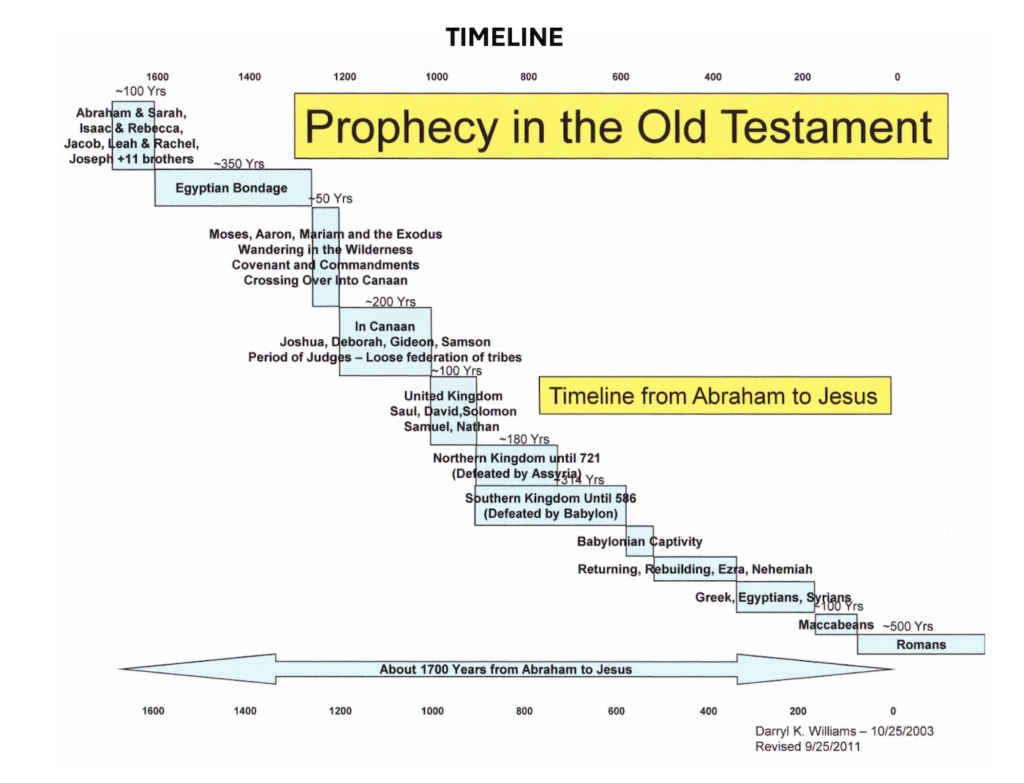
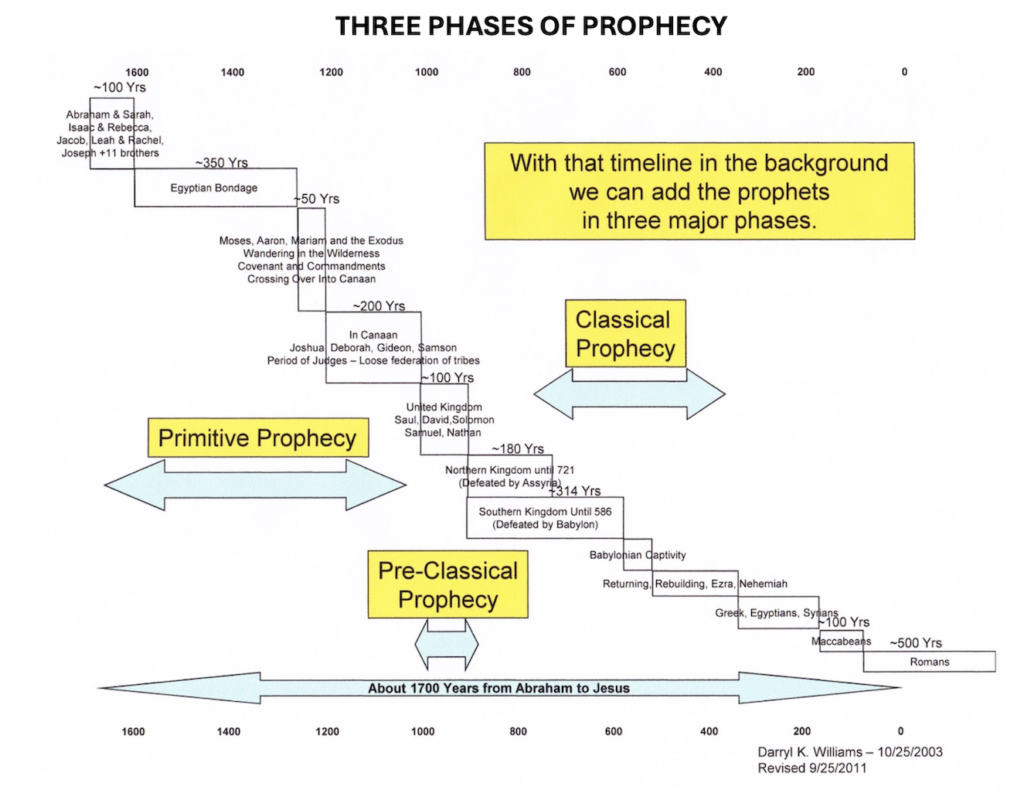
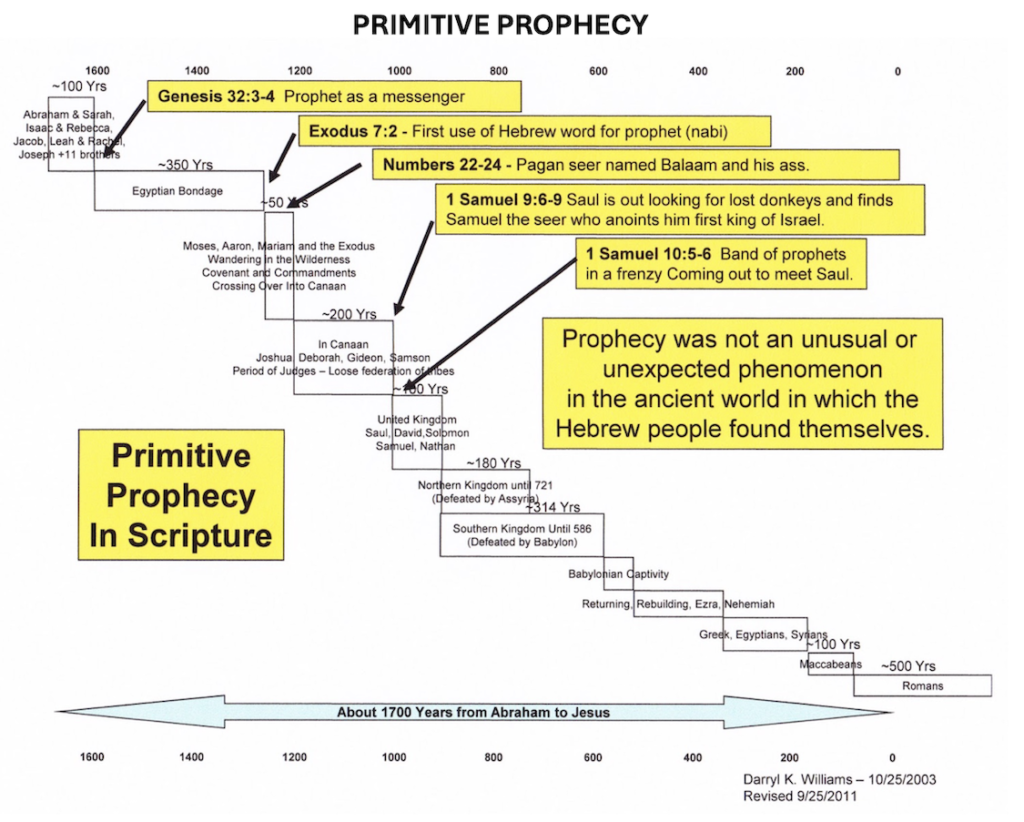
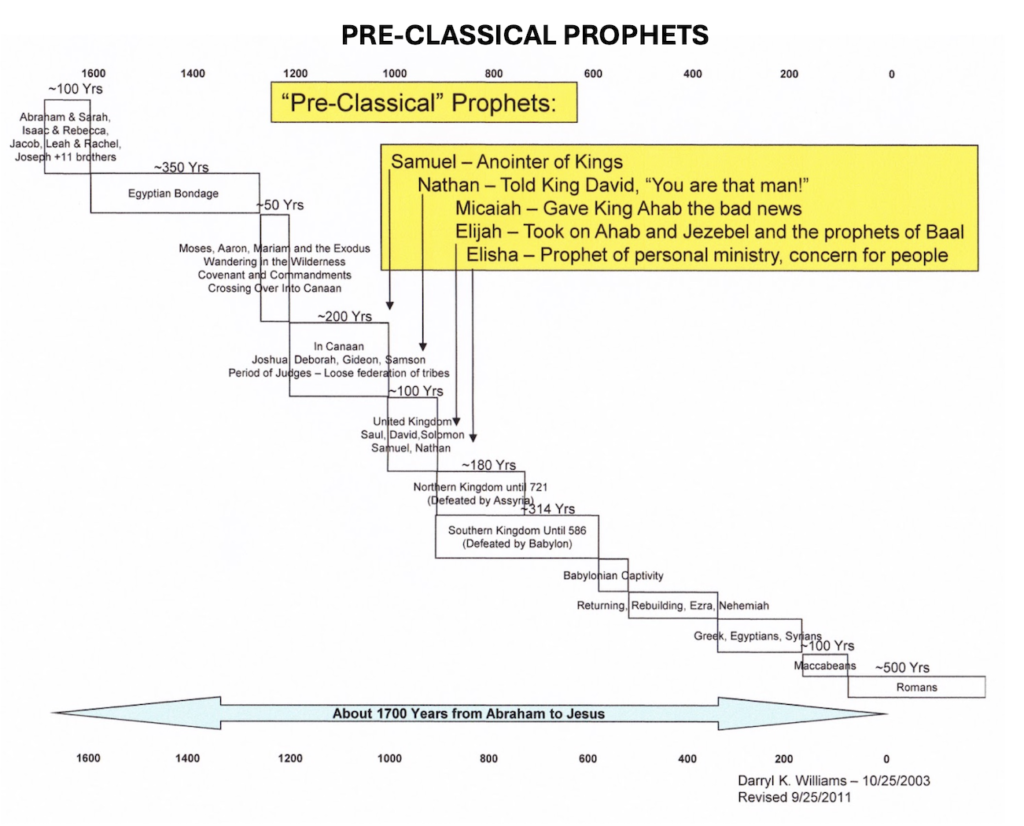
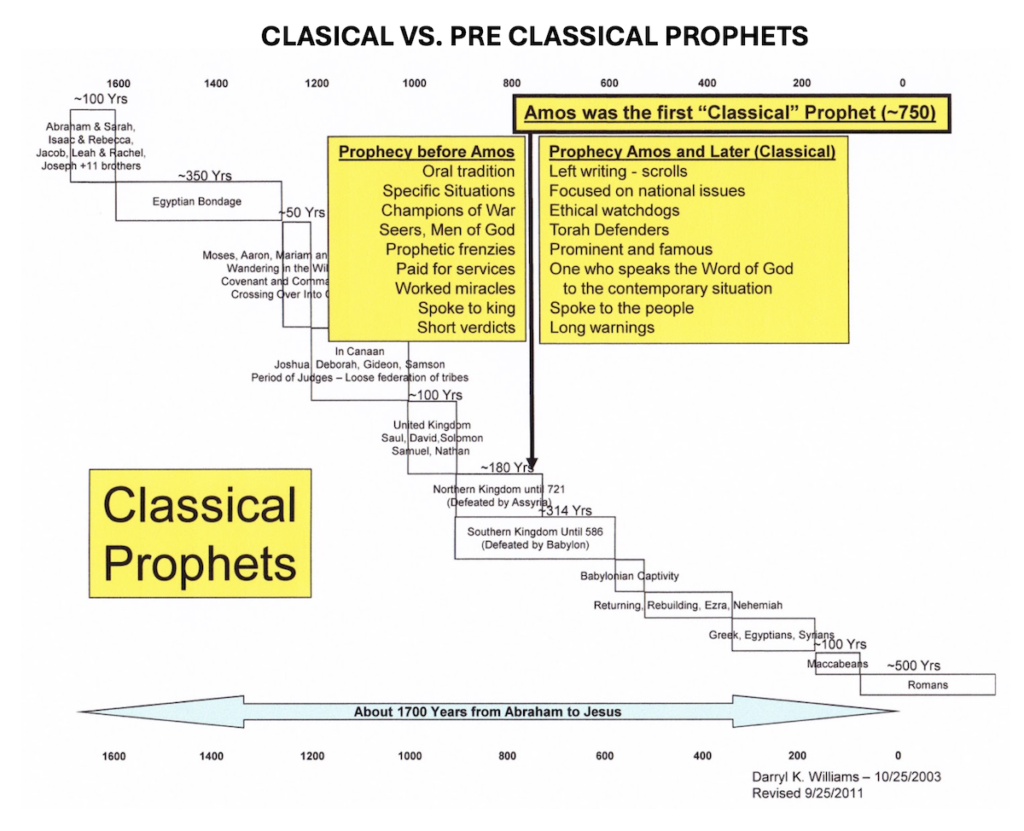
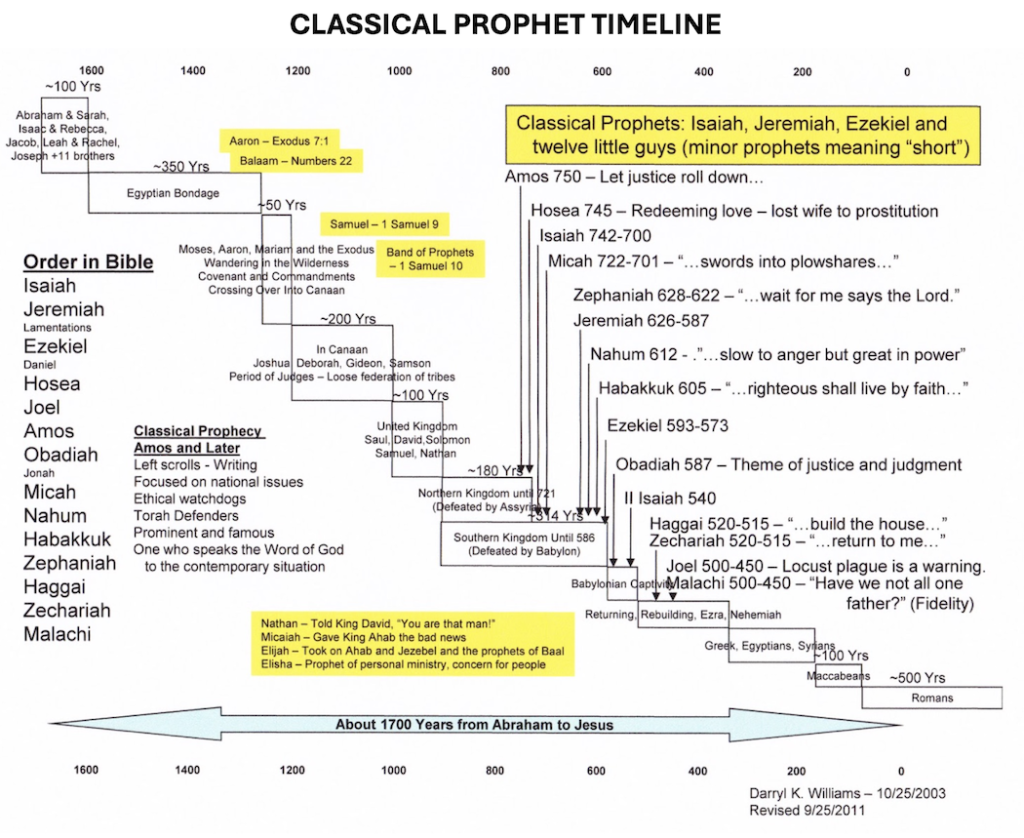
And here is the downloadable file which may be easier to read and can be printed.






And here is the downloadable file which may be easier to read and can be printed.
In Genesis 12:1, God told Abram to get up and go, and Abram, setting an example for us all, got up and went, taking his wife Sarai, his nephew Lot, and all their possessions, and headed for the land of Canaan. Abram, later to become Abraham, lived under a promise that God would bless him and make him a great nation and that through him all families of the earth would be blessed (Genesis 12:3). And that is the beginning, not of theological truth, but of history, in the Bible. And, while the story from that point on is historical, it is theological truth that dominates and is best served by the choices of people and events described and the words used to tell what happened. It is noted that not all Bible experts agree with these exact times and dates, but they are reasonable estimates.
The Old Testament story comes to life once the basic framework and timeline are in place and the people and events can be placed in proper context. It is for that reason that the timeline chart below was constructed by me, used in my OT study, and later in confirmation classes. Of course the greatest value is not in the use of such a device but in the construction of it. Nevertheless, here it is to use and/or improve as you see fit. Click on it for a better view.
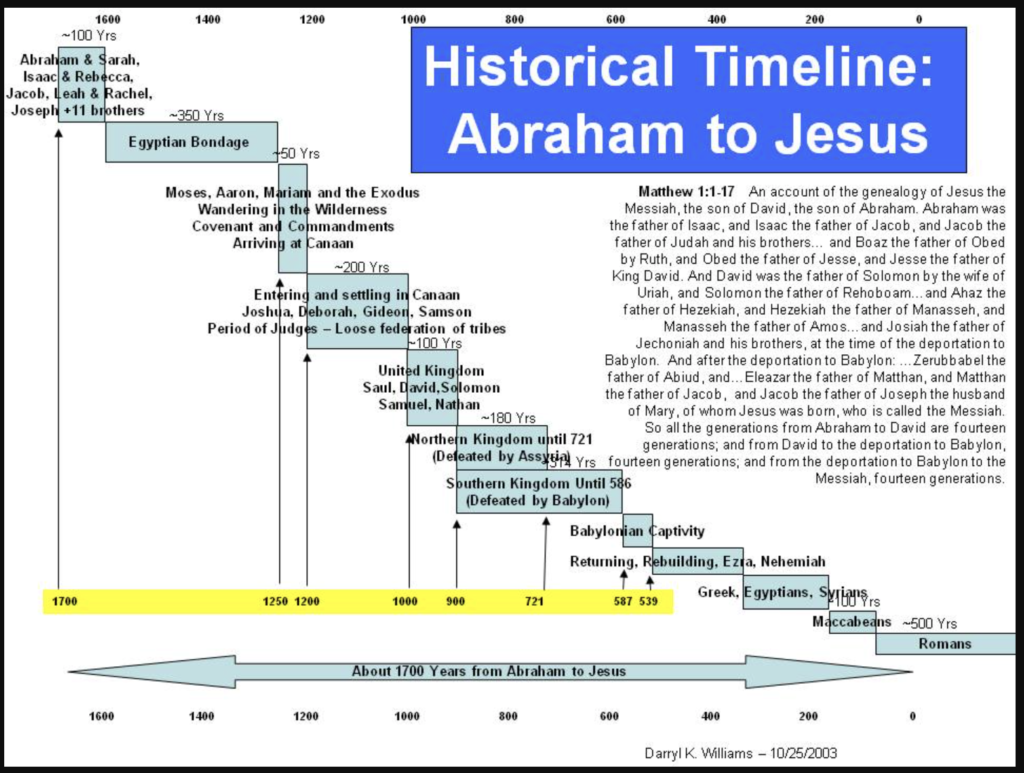
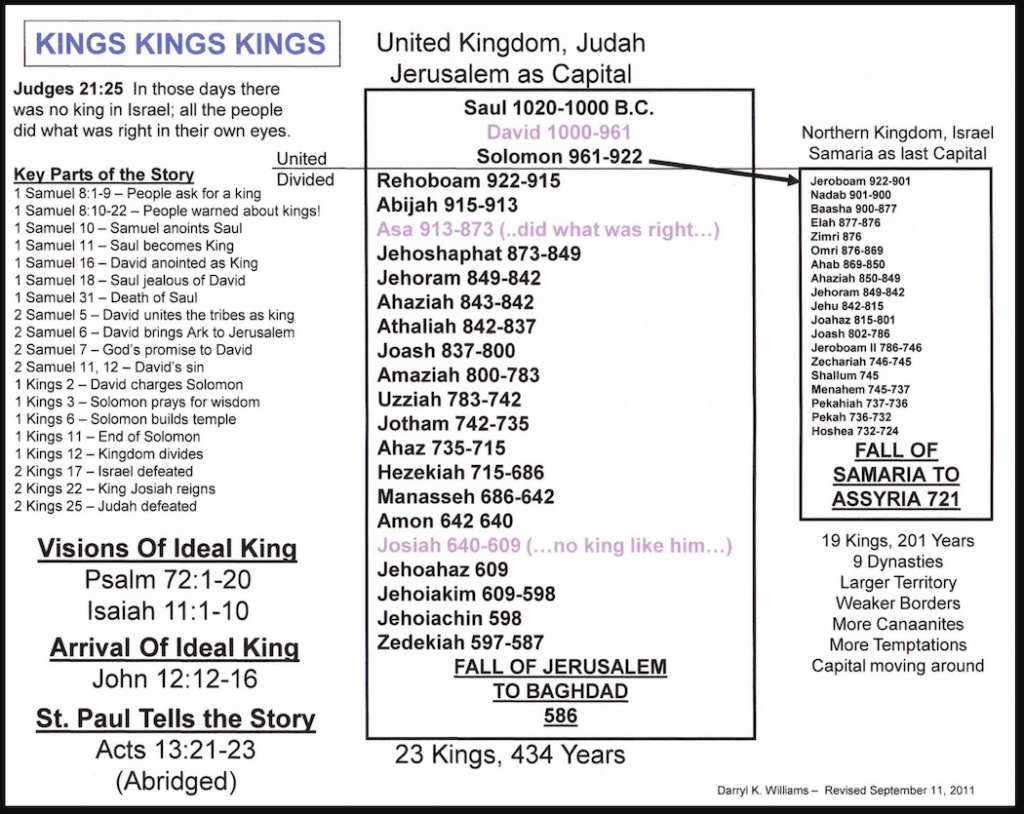
Looks like Greek to me! According to the Wikipedia article, this is the section of the New Testament we now label 2 Corinthians 11:33-12:9 (Chapter and verse designations were added only about 500 years ago.) Here it is in English, New Revised Standard Version, with all our normal grammatical helps removed and without the verse numbers. Still looks like Greek.
but I was let down in a basket through a window in the wall and escaped from his hands it is necessary to boast nothing is to be gained by it but I will go on to visions and revelations of the Lord i know a person in Christ who fourteen years ago was caught up to the third heaven whether in the body or out of the body I do not know god knows and I know that such a person whether in the body or out of the body I do not know god knows was caught up into paradise and heard things that are not to be told that no mortal is permitted to repeat on behalf of such a one I will boast but on my own behalf I will not boast except of my weaknesses but if I wish to boast I will not be a fool for I will be speaking the truth but I refrain from it so that no one may think better of me than what is seen in me or heard from me even considering the exceptional character of the revelations therefore to keep me from being too elated a thorn was given me in the flesh a messenger of Satan to torment me to keep me from being too elated three times I appealed to the Lord about this that it would leave me but he said to me my grace is sufficient for you for power is made perfect in weakness so I will boast all the more gladly of my weaknesses so that the power of Christ may dwell in me
In my math and science oriented education, 1948-1964, I missed all study of classical languages. Had I studied Latin, I would probably know all about chiastic structure or chiasms, but the first I ever heard of them was during Bible courses at Lutheran Theological Southern Seminary, 2002-2004.
Take a look at these links for a quick introduction or a refresher and some examples.
http://en.wikipedia.org/wiki/
http://en.wikipedia.org/wiki/
http://www.hccentral.com/
http://www.wonderful1.com/
http://www.bible-discernments.
I played around a bit with the passage above from 2 Corinthians and believe I found a chiastic structure buried therein, in Chapter 12, verses 1-5 (Click for a better view, then “back.”:
So, what is the point? Chiastic structures can be very helpful by pointing out where the writer intended to begin and end a sentence, a paragraph, or a longer passage. “Boast” in the above section may be considered an inclusio, bracketing the section or perhaps paragraph. So, whether it is important or not, I do not know, God knows, but it seems to me to be very useful in meditation on and study of Holy Scripture, searching for the deeper meanings.
During one seminary course, I wrote a paper on John 9, the story of the man born blind. What a great story! This narrative could be easily expanded into a screen play with interesting and complex characters and multiple underlying themes. Here is an outline I prepared of the chiastic structure:
And here is the entire text organized in that same form. I can’t claim the professor gave me a superb rating on this structure, but he didn’t declare it completely invalid either. Read and enjoy! (Click for a more readable version, then “back.”:
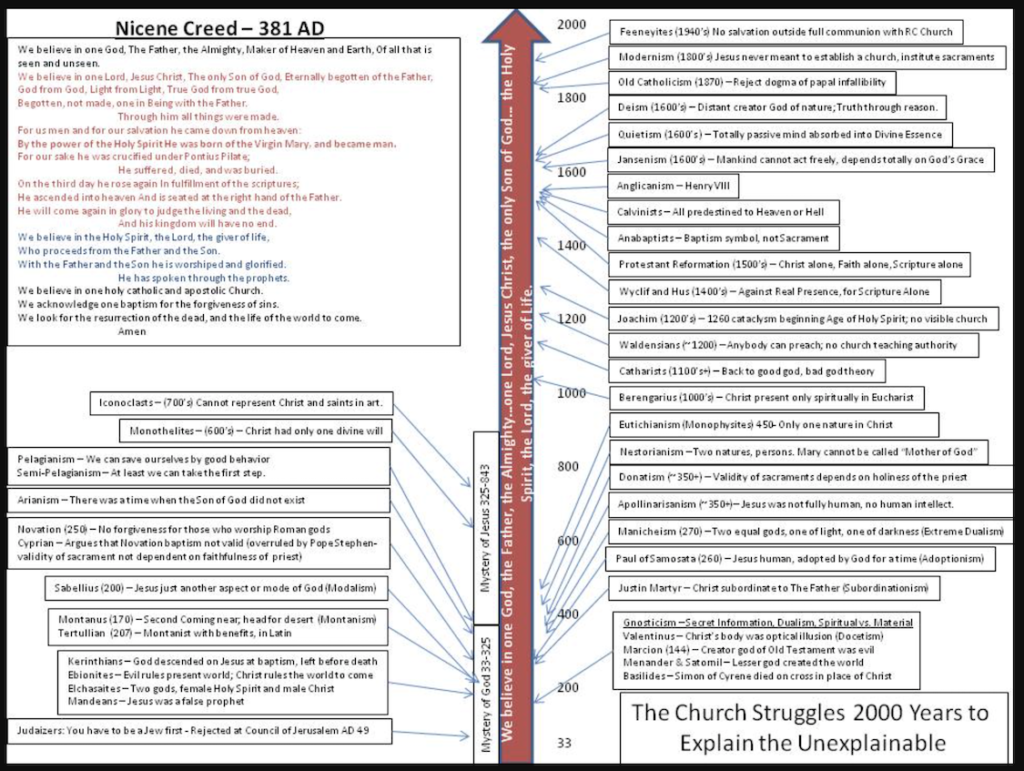
My primary sources for the information in the exhibit were Dissent from the Creed by Richard M. Hogan, The Story of Christianity by Justo L. Gonzalez, and www.newadvent.org.
April 15, 1951, I was baptized into the Christian faith at First Baptist Church, Maryville, TN. Today, Pentecost, June 12, 2011, I received the Sacrament of Confirmation at St. Peter’s Catholic Church, Columbia, SC. Thank you, Jesus, for this special manifestation of the gift of The Holy Spirit.
CHAPTER ONE
THE SACRAMENTS OF CHRISTIAN INITIATION
ARTICLE 2
THE SACRAMENT OF CONFIRMATION
1285 Baptism, the Eucharist, and the sacrament of Confirmation together constitute the “sacraments of Christian initiation,” whose unity must be safeguarded. It must be explained to the faithful that the reception of the sacrament of Confirmation is necessary for the completion of baptismal grace. For by the sacrament of Confirmation, [the baptized] are more perfectly bound to the Church and are enriched with a special strength of the Holy Spirit. Hence they are, as true witnesses of Christ, more strictly obliged to spread and defend the faith by word and deed. – From Catechism of the Catholic Church
Acts 8:12-17 But when they believed Philip preaching the things concerning the kingdom of God, and the name of Jesus Christ, they were baptized, both men and women. Then Simon himself believed also: and when he was baptized, he continued with Philip, and wondered, beholding the miracles and signs which were done. Now when the apostles which were at Jerusalem heard that Samaria had received the word of God, they sent unto them Peter and John: Who, when they were come down, prayed for them, that they might receive the Holy Ghost: (For as yet he was fallen upon none of them: only they were baptized in the name of the Lord Jesus.) Then laid they their hands on them, and they received the Holy Ghost.
Jesus said to him, ‘Why do you call me good? No one is good but God alone. – Mark 10:18
That is the response of Jesus to a man who had just knelt before him, addressed him as “Good teacher,” and asked about eternal life. I always have trouble identifying irony (I’m a chemical engineer, after all.), but I think this example of God asking a man why he is being called good because only God is good might qualify. It is difficult to be sure what is going on. Maybe Jesus recognized that the man seemed to know that He was God. Or maybe Jesus simply saw the occasion as a teachable moment about judging. Or, perhaps as suggested by commentator Pheme Perkins in The Interpreter’s Bible, Jesus was just trying to keep the focus on God alone and avoid any shift of attention from God to himself.
We have a more explicit and much more widely quoted statement about judging in Matthew 7:1. “Do not judge, so that you may not be judged.” That’s confusing because we seem to be promised in scripture that we will be judged (Hebrews 9:27 for example). Perhaps that is the reason that many read Matthew 7:1 as “Don’t condemn so that you may not be condemned.” That doesn’t help because we also know from scripture that whether we are condemned is not a function simply of whether or not we condemn (John 3:18 for example). It is sometimes assumed that Jesus’ following statement, “in the same way you judge others, you will be judged,” refers to the final judgment, but it is hard for me to believe that God is going to adjust His standards of judgment to match ours. So it seems more reasonable to me to see this Matthew 7:1 commandment as applying to earthly life, the way we are to live with each other, than to the final judgment.
I humbly offer my simple and unauthoritative solution to this question of what we are to do about judging each other. Maybe the two verses, the warning against calling anyone good and the warning against judging, can be considered together to mean that we are not to be either approving or disapproving each other but rather to just be loving unconditionally in accord with the second greatest commandment (Thou shalt love thy neighbor as thyself. – Mark 12:31). Surely we can accept and live with and care for others without making personal judgments about them. After all, we know that our basis for making such personal judgments, either positive or negative, is limited because, “…the Lord does not see as mortals see; they look on the outward appearance, but the Lord looks on the heart.” 1 Samuel 16:7
Well, the realization that the Lord is looking on our hearts should really give pause. Putting up a good front won’t make any difference in that case.
Now that regular church attendance is no longer default behavior for responsible citizens as it was when I was growing up in a small East Tennessee town, much is being written about how and why the remaining regular attendees choose the particular churches they attend. Denomination choices may well be based either on sticking with, or avoiding, the denomination of one’s parents, but congregation choices seem too often to be based on liking the pastor, the sermons, the music, the food, the fun, or the fellowship. Sometimes proximity and convenience may play a role. Opportunities for service and ministry could play a role for serious believers, because, for them, personal involvement is essential. And perhaps some are just looking for confirmation of whatever theological or social positions they have adopted as their own over time though it does seem that few are interested in theology while many are interested in social issues.
But, not all denominations and churches are losing ground. While there is concern about loss of members and drooping attendance at so-called mainline denominations in the US, Roman Catholics and Southern Baptists have kept up pretty well with growth in the population.
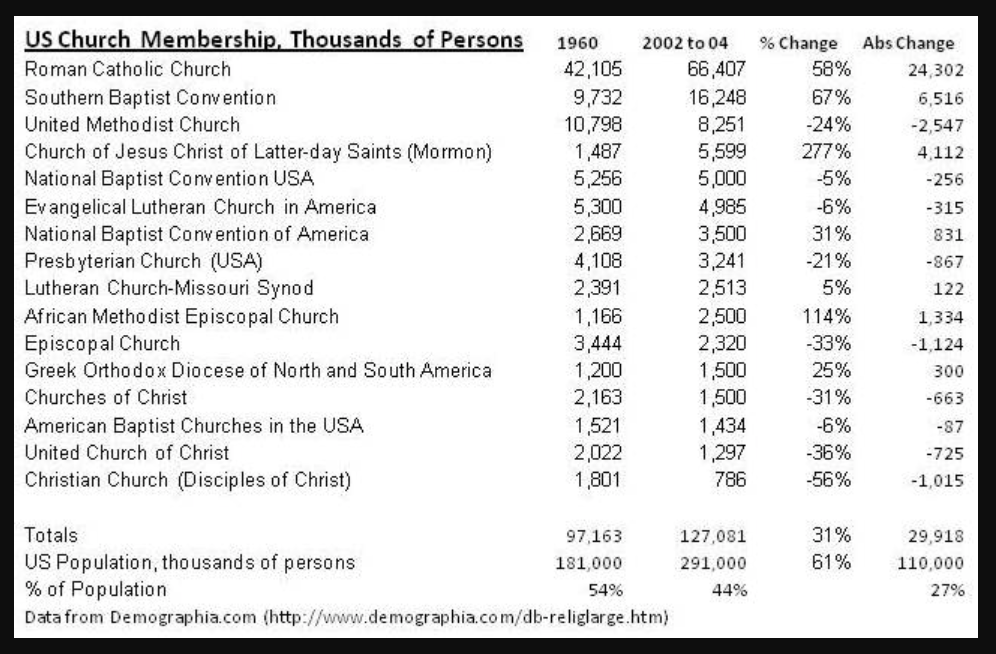
So, we might as well work together and help each other out. After all, it’s not all about us. And, if we did that, we might see a reversal of that decline in total participation.
I have been reading, for the second time, The Catechism of the Catholic Church and am now in Part Three – Life in Christ. The reading reminded me of one of the most challenging courses I took during three years at Lutheran Theological Southern Seminary, Theology of Salvation, taught by Professor David Yeago. That was in the fall of 2003. The focus was on Lutheran theology and absence from it, in recent decades, of emphasis on sanctification and spirituality.
My notes from Dr. Yeago’s lecture state the problem this way: “What it means to be saved has been reduced to something very subjective – something in our mindsets, feelings, and attitudes. No emphasis on a “new being” so all Christian life has become explainable by reason. Christianity has been redefined as something inward, private, and subjective. It has become an issue of what Jesus means to me, rather than any objective statement about Jesus.” My apologies to Dr. Yeago if I have miss-interpreted, but that is what I wrote down.
The agenda of the course was to read works of some early Lutheran theologians seeking an understanding of “newness of life” and “growth in holiness” and a concept of sanctification that would extend beyond “the subjective effect of hearing the word of forgiveness.” My particular assignment was to read and summarize for the class an excerpt from an 1875 paper by Heinrich Schmid, who addressed what he saw as a weakness in the contemporary theology of his church, a general belief that Word and Sacrament comprised God’s part in salvation and that faith, good works, and penitence were the responsibility of individuals for their own salvation. God did His part; now we must do ours. In an attempt to correct that misunderstanding, Schmid undertook the task of more fully describing and renewing interest in the Lutheran reformation perspective of Biblical salvation theology.
Schmid surveyed and summarized what some 16th and 17th century Lutheran Theologians had written about faith, justification, vocation, illumination, regeneration, conversion, mystical union, renovation, and good works, all Biblical elements of salvation. Renovation is not a word we hear in the church today, but may include sanctification, redemption, and penitence, three key words missing from Schmid’s paper. The results of his study were published in The Doctrinal Theology of the Evangelical Lutheran Church, Part III, Chapter III.
Here are Schmid’s descriptions of the terms he researched:
Faith: Means by which one partakes of salvation, accomplished only by the power of God
Justification: Act of God whereby He declares the believer “just”
Vocation: Act of Grace from the Holy Spirit by means of the Word
Illumination: An operation of the Holy Spirit addressed to the will and intellect
Regeneration: Act of Grace by which the Holy Spirit gives a sinner power to exercise faith
Conversion: Act by which the Holy Spirit turns the sinner from sin to God
Mystical Union: Act by which God makes his abode in the justified and regenerate person
Renovation: Ongoing process of leading, day by day, a more holy life before God
Beginning with the fundamental truth that Christ is the agent of salvation, faith is the means of salvation, and justification is the effect of salvation, Schmid defined and described faith and justification. Both are attributed to God. A person’s natural lack of faith can “be overcome only by God Himself. If, therefore, a man believes, this faith is to be regarded as a work of God in him…” Justification likewise has nothing to do with any action or decision on the part of the individual or with any moral change in the individual, but is “only a judgment pronounced upon man, by which his relation to God is reversed.” Faith and justification occur simultaneously and are both totally attributable to God.
Faith and justification, at a very high level, may be understood to fully describe the theology of Christian salvation. By faith, we are justified! However, they do not explain what happens in the life of an individual experiencing faith and justification or being saved. How does being saved look and feel to the person being saved, and what changes will such a person experience in his or her life? What does it mean for us to “work out our own salvation with fear and trembling?” Schmid attempted to describe “the internal conditions and the moral change which occur in a person at the same time with and after justification.” In other words, how and when and in what order does the person being saved through faith and justification experience vocation, illumination, regeneration, conversion, mystical union, renovation, and good works?
Of course the difficulty of explaining the unexplainable would all disappear if we were to focus all our attention on God rather than on whether or not we have salvation and when and where we got it. Given our inherent selfishness, that is not easily achieved. As Schmid suggests, the key indicator for an individual may be “…the strength or weakness of the confidence with which he embraces the offered salvation.”
To illustrate Schmid’s points, and to spark classroom discussion, I constructed a diagram, in the shape of a cross, in an attempt to link the salvation-related words in some kind of process beginning with Vocation or Call, the beginning of Salvation, and ending with Good Works, which are the fruits of Salvation. My first version of the diagram didn’t pass muster with Dr. Yeago because it ignored the simultaneity or at least overlapping of several of the elements. So the double ended yellow arrows in the diagram below were added in an attempt to express the uncertainty of the process linking those elements.
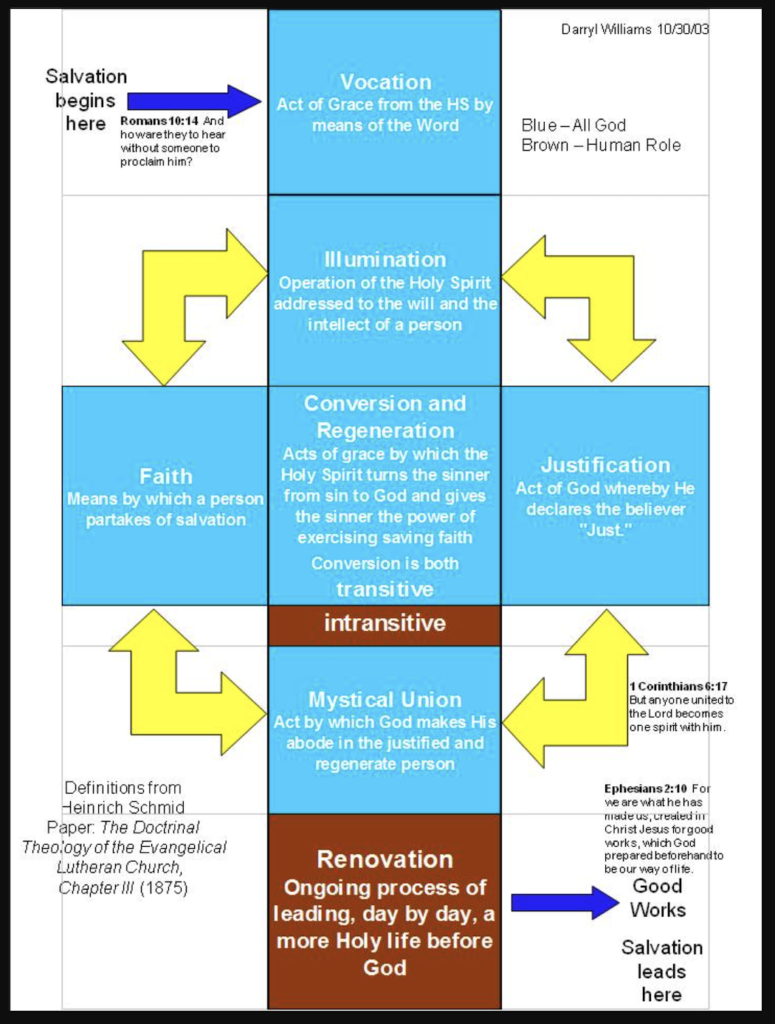
One impression I have after reviewing the Theology of Salvation course material while in the process of reading The Catechism of the Catholic Church is that those early Lutheran theologians might be more comfortable in the 21st century Catholic Church than in the 21st Century Evangelical Lutheran Church in America.
Sampling of Relevant Scripture Verses (NRSV):
Romans 6:4 – Therefore we have been buried with him by baptism into death, so that, just as Christ was raised from the dead by the glory of the Father, so we too might walk in newness of life.
2 Corinthians 5:17 – So if anyone is in Christ, there is a new creation: everything old has passed away; see, everything has become new!
Ephesians 1:4 – …just as he chose us in Christ before the foundation of the world to be holy and blameless before him in love.
Ephesians 2:8-10 – For by grace you have been saved through faith, and this is not your own doing; it is the gift of God–not the result of works, so that no one may boast. For we are what he has made us, created in Christ Jesus for good works, which God prepared beforehand to be our way of life.
Romans 5:18 – Therefore just as one man’s trespass led to condemnation for all, so one man’s act of righteousness leads to justification and life for all.
Ephesians 4:1 – I therefore, the prisoner in the Lord, beg you to lead a life worthy of the calling (vocation?) to which you have been called
1 Corinthians 2:12-13 – Now we have received not the spirit of the world, but the Spirit that is from God, so that we may understand the gifts bestowed on us by God. And we speak of these things in words not taught by human wisdom but taught by the Spirit, interpreting spiritual things to those who are spiritual. (illumination)
John 3:5-6 – Jesus answered, “Very truly, I tell you, no one can enter the kingdom of God without being born of water and Spirit. What is born of the flesh is flesh, and what is born of the Spirit is spirit. (regeneration)
Matthew 4:17 – From that time Jesus began to proclaim, “Repent, for the kingdom of heaven has come near.” (conversion)
John 6:56 – Those who eat my flesh and drink my blood abide in me, and I in them. (mystical union?)
1 Corinthians 6:17 – But anyone united to the Lord becomes one spirit with him.
Romans 6:22 – But now that you have been freed from sin and enslaved to God, the advantage you get is sanctification. The end is eternal life. (Renovation)
James 2:26 – For just as the body without the spirit is dead, so faith without works is also dead.
Philippians 2:12-13 – Therefore, my beloved, just as you have always obeyed me, not only in my presence, but much more now in my absence, work out your own salvation with fear and trembling; 13 for it is God who is at work in you, enabling you both to will and to work for his good pleasure.
I am always moved by the reading of the seventh chapter of The Acts of the Apostles in which Stephen, newly elected deacon facing accusations of blasphemy, summarizes the Old Testament story in a 1300 word homily. Two thousand years later it is easy to forget that the Jewish Bible, the Old Testament, was the only “Holy Scripture” for the early church, maybe for as long as 300 years, until the New Testament Canon was agreed upon and added.
In his discourse, Stephen recounts the stories of Abraham, Isaac, Jacob, Joseph, Moses, and David and then reminds his listeners that their ancestors had persecuted the prophets who had “foretold the coming of the Righteous One.” And then the crowd drags him out of the city and stones him to death as Saul, later to become a teller of the same story he has just heard, looks after the coats of the killers and, presumably, looks on approvingly as the blood of Stephen is splattered about. If you haven’t read it in a while, it’s worth five minutes of your time now.
A sampling of New Testament occurrences of “scripture,” always referring to the Old Testament.
Luke 4:21 -Then he (Jesus) began to say to them, “Today this scripture has been fulfilled in your hearing.”
John 2:22 – After he was raised from the dead, his disciples remembered that he had said this; and they believed the scripture and the word that Jesus had spoken.
John 7:42 – Has not the scripture said that the Messiah is descended from David and comes from Bethlehem, the village where David lived?”
Acts 1:16 – “Friends, the scripture had to be fulfilled, which the Holy Spirit through David foretold concerning Judas, who became a guide for those who arrested Jesus—
Acts 8:30-35 – So Philip ran up to it and heard him (Ethiopian eunuch) reading the prophet Isaiah. He asked, “Do you understand what you are reading?” 31 He replied, “How can I, unless someone guides me?” And he invited Philip to get in and sit beside him. 32 Now the passage of the scripture that he was reading was this: “Like a sheep he was led to the slaughter, and like a lamb silent before its shearer, so he does not open his mouth. 33 In his humiliation justice was denied him. Who can describe his generation? For his life is taken away from the earth.” 34 The eunuch asked Philip, “About whom, may I ask you, does the prophet say this, about himself or about someone else?” 35 Then Philip began to speak, and starting with this scripture, he proclaimed to him the good news about Jesus.
Galatians 3:8 – And the scripture, foreseeing that God would justify the Gentiles by faith, declared the gospel beforehand to Abraham, saying, “All the Gentiles shall be blessed in you.”
2 Timothy 3:16-17 – All scripture is inspired by God and is useful for teaching, for reproof, for correction, and for training in righteousness, 17 so that everyone who belongs to God may be proficient, equipped for every good work.